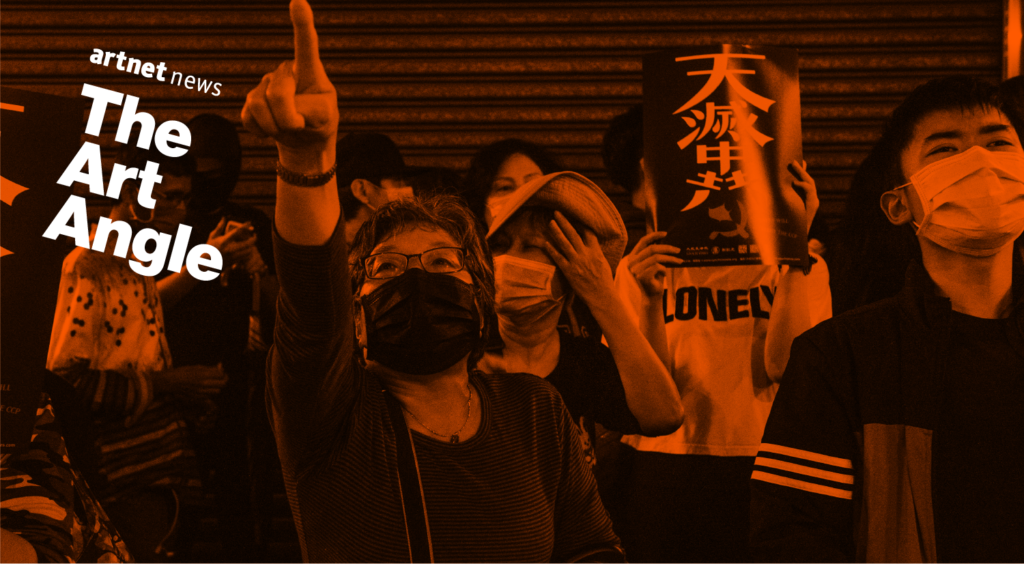The Art Angle
The Art Angle Podcast: What Does an Art Scene Look Like Under the Coronavirus?
This week, reporter Vivienne Chow calls in from her home in Hong Kong to share her experience living in a region ravaged by the COVID-19 virus.

This week, reporter Vivienne Chow calls in from her home in Hong Kong to share her experience living in a region ravaged by the COVID-19 virus.

Artnet News

Welcome to the Art Angle, a podcast from Artnet News that delves into the places where the art world meets the real world, bringing each week’s biggest story down to earth. Join host Andrew Goldstein every week for an in-depth look at what matters most in museums, the art market, and much more with input from our own writers and editors as well as artists, curators, and other top experts in the field.
Usually, the first weeks of March are intensely busy ones for the international art community, as they lead up to the Art Basel Hong Kong art fair: an unmissable event that galleries, museums, and even other cultural sectors in the region have used as an anchor to present their own very best programming to visitors from around the globe. This year, though, the staggering impact of the novel 2019 coronavirus has forced Art Basel to cancel its Asian fair, beginning a long cascade of postponed and canceled art events around the globe.
For the residents of Hong Kong, life has been turbulent for much of the past year, ever since pro-democracy protests began roiling the city and its art scene in late March 2019. Although Hong Kong has been praised by the World Health Organization for its rapid and effective response to the virus—it harbors only about 115 cases of COVID-19 at this time, including just three fatalities—its ace public-health infrastructure has not exempted the city from an economic crisis first sparked by the demonstrations, then accelerated by the measures taken to protect its citizens from infection.
Where does this latest upheaval leave Hong Kong’s artistic community? Roughly two months after joining the Art Angle to discuss the effects of the protests, reporter Vivienne Chow calls in to this week’s episode from her home in Hong Kong, where she and her fellow residents have been self-isolating for weeks. She provides a front-line view of both the challenges and the opportunities presented by the coronavirus, from the eerie reality of museums, art galleries, and auction houses devoid of people, to the ingenuity and resilience shown by the many businesses launching virtual exhibition and selling platforms to compensate for the loss of face-to-face interactions with collectors, curators, and enthusiasts.
As the rest of the world tries to cope with the ever-changing conditions of the epidemic, Chow’s account provides perspective, and even a measure of hope, for how life and culture can weather the crisis.
Listen above and subscribe to the Art Angle on Apple Podcasts, Spotify, SoundCloud, or wherever you get your podcasts. (Or catch up on past episodes here on Artnet News.)
The Art Angle Podcast: How an Art-Dealing Prodigy Became the market’s Most Wanted Outlaw
The Art Angle Podcast: Is the Museum of Ice Cream the Future of Art, or Just a Sugar Rush?
The Art Angle Podcast: What Is Saudi Arabia Trying to Do With Contemporary Art?
The Art Angle Podcast: How Hollywood Finally Fell for the Art Market
The Art Angle Podcast: How Jeffrey Epstein Made the Art World His Hunting Ground
The Art Angle Podcast: How the Art World Fell Under the Spell of the Occult
The Art Angle Podcast: Nicolas Party on Why Being an Art Star Is Like Being in Love
The Art Angle Podcast: What Do the Protests in Hong Kong Mean for Art?
The Art Angle Podcast: Four Predictions on How the Art World Will Transform Itself in 2020
The Art Angle Podcast: The Radical, Viral Artworks That Defined the 2010s